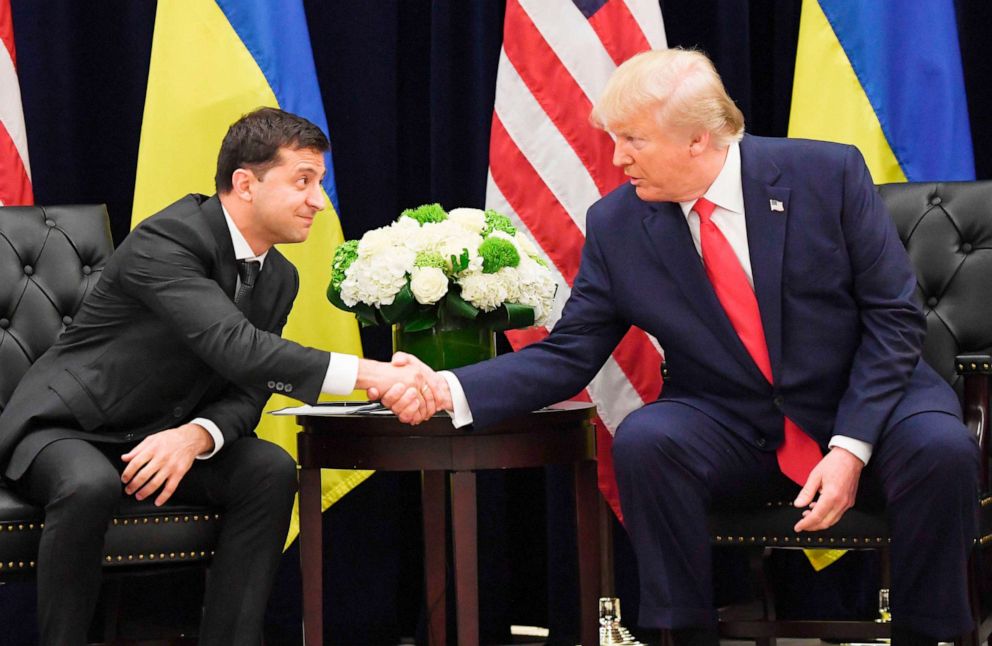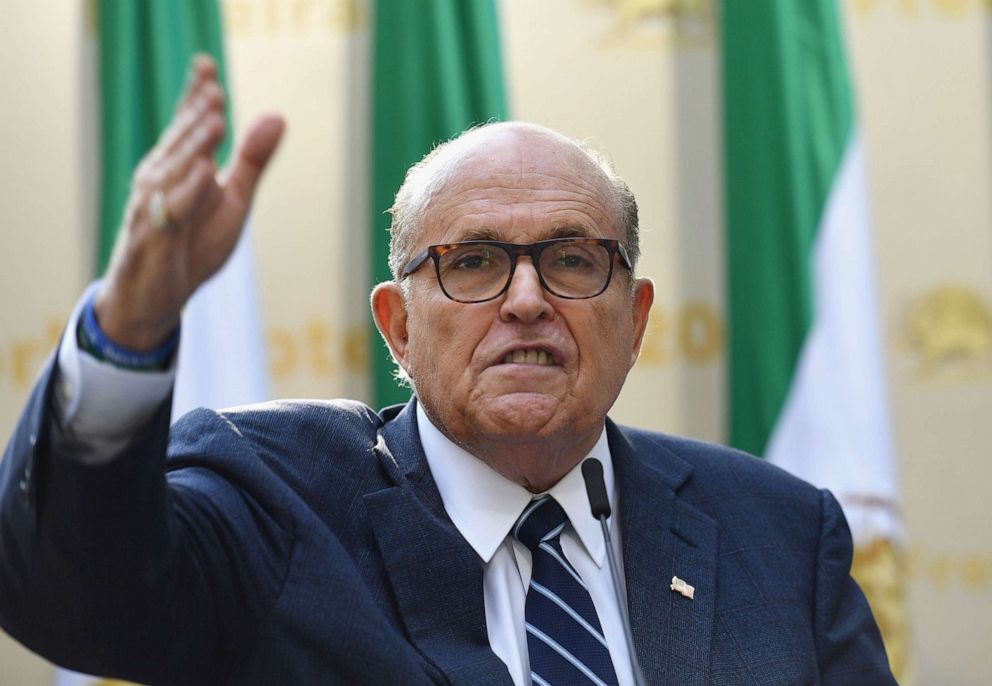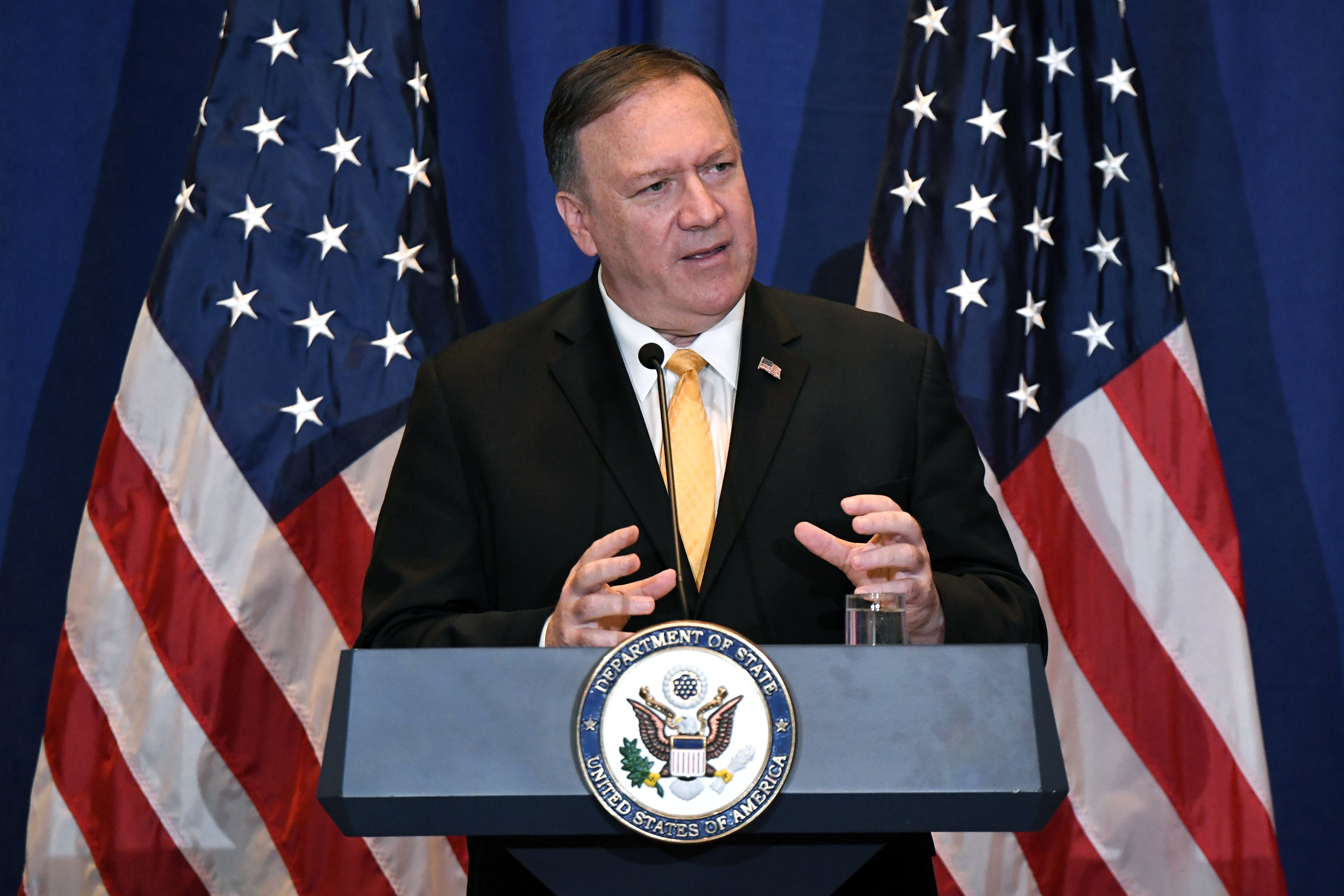Pompeo defends State Department role in Giuliani's Ukraine efforts
Giuliani says he was asked by the department to contact Ukrainian officials.
Secretary of State Mike Pompeo is defending the actions of State Department officials who facilitated President Donald Trump's personal lawyer Rudy Giuliani in his efforts to pressure Ukrainian officials to investigate Trump's political opponents.
The contact between Giuliani and two U.S. ambassadors have become the focus of a congressional investigation amid allegations they were inappropriate. Three congressional committee chairs urged Pompeo to turn over documents related to those contacts and more by Thursday or face a subpoena.
There are also questions about the former U.S. ambassador to Ukraine, who reportedly was recalled after allegations the State Department has described as an "outright fabrication" but that Trump seemed to endorse, calling her "bad news."

Giuliani has spent months now trying to pressure the government of Ukraine's newly elected president Volodymyr Zelenskiy to investigate unfounded allegations of corruption by former Vice President Joe Biden and his son, Hunter, and of election interference against Trump's 2016 presidential campaign by Ukrainian officials, accused of leaking details about then-campaign manager Paul Manafort and his work for the corrupt Russian-backed oligarch who once led Ukraine.
The House has begun impeachment proceedings on allegations from a whistleblower that, among other things, Trump withheld nearly $400 million of U.S. military assistance to Ukraine to get his government to investigate both issues. In particular, Trump is accused of pressuring Zelenskiy during a phone call on July 25, about a week after the White House decided to withhold the aid.
Months before that call but some time after their first call, Zelenskiy's office reached out to U.S. Special Envoy for Ukraine Kurt Volker about getting in touch with Giuliani. Volker called the former New York City mayor to do so, Volker has confirmed, and Giuliani later met Zelenskiy staffer Andriy Yermak in Madrid in May.
In an interview with Fox News Tuesday, Giuliani said the department directed him to act, later telling other outlets that he briefed Volker and U.S. ambassador to the European Union Gordon Sondland after his meetings.
Pompeo said he had not yet read the entire whistleblower complaint, but defended what he'd "seen so far."
"To the best of my knowledge, so from what I've seen so far, each of the actions that were undertaken by State Department officials was entirely appropriate and consistent with the objective that we've had," he said, which is "to tighten our relationship [and] to help end corruption in Ukraine."
The military assistance was eventually released by the State Department and Pentagon. Mark Green, the U.S. Agency for International Development administrator, told ABC News Thursday that none of his agency's assistance to Ukraine was ever held up: "I've never had a single conversation with anybody in the administration" about Ukraine, he said.

But Congress has a different view. Three Democratic committee chairs -- Rep. Eliot Engel of the Foreign Affairs Committee, Elijah Cummings of the House Oversight Committee and Adam Schiff of the House Intelligence Committee -- wrote Pompeo a second letter Monday requesting documents related to the two issues Giuliani has pressed for an investigation on, to Trump and Zelenskiy's call, to and from Giuliani, and to the suspension of U.S. military assistance to Ukraine.
If the department did not tell them whether it would comply by Thursday, they would begin to issue subpoenas, the chairmen wrote: "By withholding these documents and refusing to engage with the Committees, the Trump Administration is obstructing Congress' oversight duty under the Constitution to protect our nation's democratic process."
Pompeo has not said whether they will. The State Department has not responded to request for comment.
A department spokesperson has consistently said that Giuliani "does not speak on behalf of the U.S. government," not just on Ukraine, but also when he has advocated for regime change in Iran and said American hostages in North Korea were about to be freed.
But the president directed Zelenskiy to speak with Giuliani at least eight times in that July 25 call, according to the rough transcript released by the White House Wednesday.

There are also lingering questions about the former U.S. ambassador to Ukraine, Marie Yovanovitch. A career diplomat still in the Foreign Service and serving as a fellow at Georgetown University, Yovanovitch reportedly ended her term in Kyiv months early when she departed in May. Giuliani claimed in an interview that she was "fired" after he and Ukraine's former public prosecutor trashed her for obstructing investigations into corruption.
That's an allegation the State Department has fiercely denied. In March, a spokesperson called it an "outright fabrication" to The Hill newspaper and said it "does not correspond to reality" to Radio Free Europe/Radio Liberty, adding to RFE/RL that "such attacks redouble our resolve to help Ukraine with the struggle against corruption."
Trump, however, appears to believe them. In his call with Zelenskiy in July, he called Yovanovitch "bad news," with Zelenskiy thanking Trump for being "the first one who told me that she was a bad ambassador."
The State Department did not respond to requests for comment on whether Yovanovitch was recalled by the White House and whether they stood by their previous defense of her.
But retired diplomats who worked with the former ambassador to Armenia and Kyrgyzstan came to her defense after the White House released the memo: "Any attack on their integrity and commitment to non-partisan service does a great disservice to them, to their families and to our country," the American Foreign Service Association, the diplomats' union, said in a statement Thursday.




